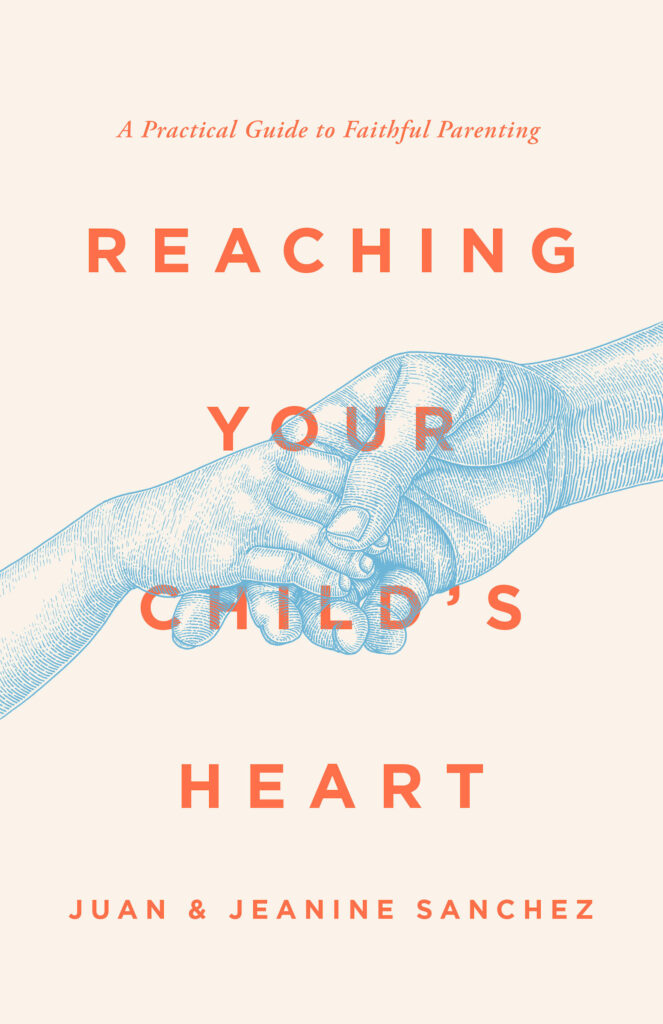Raising children can feel overwhelming as you try to navigate the many voices telling you what to do and not to do, but God has already given you everything you need to be faithful parents. In Reaching Your Child’s Heart: A Practical Guide to Faithful Parenting, Juan and Jeanine Sanchez encourage parents from their gospel-shaped perspective that children don’t need perfect parents—they need a perfect Savior.
As they share their own journey of parenting five children, the authors highlight the importance of a team-based approach to parenting. They emphasize focusing on children’s hearts, rather than behavior modification, and illustrate how daily faithfulness in the routine cares of life is never a waste of time.
In this interview, Juan and Jeanine share more about their book and tips for parenting.
Q: How is Reaching Your Child’s Heart different from most Christian books on parenting? What can readers expect from reading your book?
We have benefited greatly from many parenting books. Lately, there has been an important and helpful emphasis on releasing parents from the burden of “justification by parenting.” That has resulted in a much-needed corrective that emphasizes the gospel. We emphasize this reality when we say, our kids don’t need perfect parents; they need and already have a perfect savior.
Still, in serving in a local church, we receive many questions after the fact – “Yes, I know I am not justified by parenting, but what do I do when…?” It is this need for practical, gospel-grounded counsel that led us to write Reaching Your Child’s Heart. We want parents to know that Jesus is enough and that he has provided everything we need to shepherd our children. We want to “sit” with parents and encourage them by establishing the biblical and theological foundation of parenting while also providing clear, practical, biblical wisdom in specific ways during each stage of a child’s life.
Q: What should our greatest desire as a parent be? What is God’s vision of our role as parents?
In laying the biblical and theological foundation of parenting, we remind parents that God’s desire from the very beginning was to have godly offspring—children who reflect the image and glory of God in all they say, think, and do.
Sadly, because of sin, the image of God in us is marred. Not eradicated, but damaged. Still, God’s desire has not changed. So, God sent his beloved Son, his true image, to save us and over time conform us to the image of God. Our role as parents is to provide an environment of biblical teaching and a godly example in which our children learn about the love of God and the gospel so that the Spirit may use our instruction and discipline to draw them to Christ.
Our greatest desire should not be to have well-behaved children but to have children who reflect the image of God.
Q: You write that God does not expect us to be perfect parents and that our children don’t need perfect parents. What do our children need most?
Because of our natural sinful condition, we need a perfect Savior. And that is what God has given us in Jesus Christ. What our children need most is a new heart, and only God can give them that. And he does that by his gospel word, in the power of the Spirit.
What our children need from us is to be faithful parents who admit our sins, ask for forgiveness, and model the gospel. They need us to show them the Father’s love and their Savior’s sacrifice. They need us to be faithful in teaching and living out this gospel before them.
Q: What problems do parents run into when they have a child-centered home instead of a parent-directed home?
Let’s admit that having a home run by your children’s desires is an unrealistic ideal. It is pie in the sky. Our sinful tendency is to push for our selfish desires. And when our children are unbelieving and young, they don’t know what they most need. So, why would they be in charge of how the household should run?
Sadly, though, too many homes are child-centered. The child is not only the center of all of life in the home, but he or she has control. At first, when the child is very young, it is cute to allow the child many freedoms. But as the child grows in age and begins to make unwise choices we disagree with, conflict erupts. What ends up happening in many child-centered homes is that the child has been trained that he or she is boss. When we begin to take freedoms away, they object.
It is better and wiser to direct our children at a young age, teaching them to accept our choices for them. Then as they grow, we teach them how to make wise choices. Our aim is to prepare our children to make wise choices as they mature so that when they are adolescents, they can make choices and fail in a safe environment. When we give our children responsibility as they mature and are able to handle such choices, we will more likely enjoy the teenage years rather than dread them. Of course, our prayer throughout is that the Lord would grant them new hearts and give them his Spirit so that their choices are approached with a renewed mind and heart.
Q: What are some of the godly behaviors parents need to be modeling for their children daily within the home?
In a sense, parents need to model their entire life lived in dependence upon God and his word before their children. We need to show them how we need God’s grace and the Spirit’s help to obey God. We need to show them how to confess sin and ask for forgiveness. We need to show them how to spend time with the Lord in the word and prayer. And we need to show them the love of the Heavenly Father who is slow to anger and quick to forgive.
Q: There are many opinions out there about the correct way to discipline children, from: “Spare the rod, spoil the child” to “gentle parenting,” but what does biblical discipline actually look like? What are the two main components of biblical discipline?
Sadly, much parental discipline is done out of frustration. It’s almost as if we expect our children to guess what our standard is because whenever they transgress our standard, we react in frustration, anger, or exasperation. But, have you taught them what to expect?
Biblical discipline requires first and foremost positive instruction. This is a much-neglected need. We need to spend time teaching our children God’s standard. We need to teach them God’s word and what God expects. As we spend time teaching our children God’s word, they will begin to understand what we expect. They won’t have to guess. Consequently, when they don’t do what they have been taught to expect, they are in direct defiance.
Having taught what God requires, we correct when they transgress that standard. And there are many ways to apply corrective discipline, not just physical chastisement. However, when done in love and with grace and patience, physical chastisement is a biblical option. Proverbs gives us a wide variety of ways to correct our children.
Q: When does positive instruction transition into corrective discipline?
Assuming we have spent sufficient time positively instructing God’s standard, when it is clear that their heart is rebellious to that standard and to us as their parents, we must correct.
Corrective discipline requires we distinguish between childishness and foolishness. If a child spills her drink accidentally, that is childishness. But if the same child throws the drink at her sibling, that is foolishness and requires corrective discipline.
Q: What are the basic building blocks of laying a foundation of biblical instruction in the home, even from the earliest age?
As Moses says in Deuteronomy 6, these things must first be on our hearts. Only then may we teach our children. So, first, we must be in God’s Word, receiving the Spirit’s instructions for our lives. Second, we take every opportunity to teach God’s Word to our children—when they wake up in the morning, as they walk along the way, as we eat together, and as we go to bed.
We should read and pray with our children. Establish times when the family reads together—the Bible, Christian books, adventure books. We want to instill in our children a love of reading so that they become lifelong learners.
Q: What are the most common parenting traps that we should watch out for, regardless of the age of our children?
Toddlers/Preschoolers: Using too many words to try to persuade your child to obey. Train, instruct, and correct. They don’t need the reason why. Obedience should not be questioned.
Middle Years: Being a threatening/repeating parent. Give your instruction and expect obedience, especially if you have trained for it. Don’t get caught in the “If you don’t do this, then I will…” trap.
Teenagers: Not giving them freedoms that correspond to their responsibility. We tend to pull in the reigns during the teenage years, restricting age-appropriate freedoms because we are afraid. Fear-based-parenting is an awful master. This frustrates your teenager and does not draw them into relationship. These years should be full of healthy conversations helping them understand the “why” behind your decisions.
Q: What single piece of advice would you give parents who are entering the often-dreaded teenage years of parenting?
Don’t be afraid of your teenager. Often we don’t do hard things because we don’t want to make them mad or lose the relationship. We are not their friends; we are their parents. God has given us wisdom, and we must steward that wisdom well, at times making hard decisions that are good for our teenagers, even though they may not like it. That’s when having hard conversations in times of non-conflict is helpful, allowing them to share their disappointments with us in respect. Oh, and don’t forget to have some fun with your kids!
Reaching Your Child’s heart
Raising children can feel overwhelming as you try to navigate the many voices telling you what to do and not to do, but God has already given you everything you need to be faithful parents! In Reaching Your Child’s Heart, Juan and Jeanine Sanchez encourage parents from their gospel-shaped perspective that children don’t need perfect parents—they need a perfect Savior.







